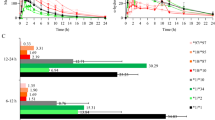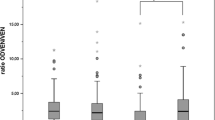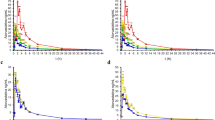Summary
After a single 200 mg oral dose of metoprolol tartrate the mean metoprolol AUC was found to be six-fold higher in poor metabolizers (PMs) of debrisoquine than in extensive metabolizers (EMs). This was associated with impaired metabolic clearance via α-hydroxylation and O-dealkylation. A population study (n=143) has shown a bimodal distribution in the ratio of metoprolol: α-hydroxymetoprolol recovered in urine which was correlated highly with the debrisoquine metabolic ratio. Nine per cent of the population were PMs. Plasma metoprolol concentrations three hours after a 100 mg oral dose of metoprolol were greater than 200 ng/ml in PMs but were lower than this in most EMs. This dose of metoprolol given once daily provided a clinically significant reduction (16%) in exercise heart rate in PMs after 24 hours. EMs require conventional doses (100 mg b.d.) to achieve the same degree of β-blockade. Preliminary data from family studies support the view that the defect in metoprolol oxidation is inherited. In 12 hypertensive patients who were EMs we compared the β-blocking activity and antihypertensive effect of chronic treatment with metoprolol 200 mg once daily (conventional and long-acting formulations), with those of atenolol 100 mg once daily and placebo. The effects of all active preparations were similar at 3.5 hours but atenolol was superior to all metoprolol formulations at 24 hours after dosing. It is concluded that for the majority of patients metoprolol should be prescribed twice daily when using currently available dosage forms. Relationships between oxidation phenotype and side-effects should be examined.
Similar content being viewed by others
References
Borg KO, Carlsson E, Hoffman KJ, Jonsson TE, Thorm H, Wallin B (1975) Metabolism of metoprolol-(3H) in man, the dog and the rat. Acta Pharmacol Toxicol 36 (Suppl V): 125–135
Freestone S, Silas JH, Lennard MS, Ramsay LE (1982) Comparison of two long-acting preparations of metoprolol with conventional metoprolol and atenolol in healthy men during chronic dosing. Br J Clin Pharmacol 14: 713–718
Lennard MS (1985) Quantitative analysis of metoprolol and three of its metabolites in urine and liver microsomes by high performance liquid chromatography. Submitted for publication to J Chromatogr
Lennard MS, Silas JH (1983) Rapid determination of metoprolol and alpha hydroxymetoprolol in human plasma and urine by h.p.l.c J Chromatogr 272: 205–209
Lennard MS, Silas JH, Freestone S, Ramsay LE, Tucker GT, Woods HF (1982) Oxidative phenotype — a major determinant of metoprolol metabolism and response. N Engl J Med 307: 1558–1560
Lennard MS, Silas JH, Smith AJ, Tucker GT (1977) Determination of debrisoquine and its 4-hydroxy metabolite in biological fluids by gas chromatography with flame ionisation and nitrogen selective detection. J Chromatogr 133: 161–166
Lennard MS, Tucker GT, Silas JH, Freestone S, Ramsay LE, Woods HF (1983a) Differential stereo-selective metabolism of metoprolol in extensive and poor debrisoquine metabolisers. Clin Pharmacol Ther 34: 732–737
Lennard MS, Freestone S, Ramsay LE, Tucker GT, Woods HF (1983b) Metabolism and action of beta-adrenoceptor blocking drugs in relation to polymorphic drug oxidation. Presented at the Workshop on the Molecular Basis of Polymorphic Drug Oxidation in Man. Otzenhausen, Germany, September 1983
Mahgoub A, Idle JR, Dring LG, Lancaster R, Smith RL (1977) Polymorphic hydroxylation of debrisoquine in man. Lancet 2: 584–586
Regardh CG, Johnsson G (1980) Clinical pharmacokinetics of metoprolol. Clin Pharmacokinet 5: 557–569
Report of MRC Working Party on mild to moderate hypertension (1981) Adverse reactions to bendrofluazide and propranolol for the treatment of mild hypertension. Lancet 2: 539–543
Silas JH, Freestone S, Lennard MS, Ramsay LE (1984) Chronic dosing comparison of three formulations of metoprolol and atenolol in hypertensive patients. Br J Clin Pharmacol 18: 270P-271P
Author information
Authors and Affiliations
Rights and permissions
About this article
Cite this article
Silas, J.H., McGourty, J.C., Lennard, M.S. et al. Polymorphic metabolism of metoprolol: Clinical studies. Eur J Clin Pharmacol 28 (Suppl 1), 85–88 (1985). https://doi.org/10.1007/BF00543716
Issue Date:
DOI: https://doi.org/10.1007/BF00543716




